“Fuck your constitutional recognition, I want a treaty,” writes a young Australian Aboriginal man, as Aboriginal momentum grows for a treaty with the invader society and against government-driven plans to write them into the constitution. “Right now, I just want to yell, ‘Fuck your recognition.’ I know you think ‘it's the right thing to do’ but I don't want it and we don't need it. I want a treaty. A treaty forces you to see me as an equal with a separate identity, history and culture that has existed for tens of thousands of years. Recognition forces me to ask to be seen by you in a colonial system that I don't want to legitimise. Fuck that,” Nayuka Gorrie comments at the online platform of Vice Australia magazine.
The federal
government is spending millions of taxpayers’ dollars on publicising
its recognition drive, not a cent on the opposing stance.
Gorrie picks up
some of the criticisms of constitutional reform by indigenous elders.
Why is the government pushing it and why is mainstream media hiding it?
- The government wants
more control over First Nations people, especially those living on 'valuable
mining land'
- The commercial channels (ch7, ch9. ch10 etc) are funded by big business
interests and regulated by the government
- The ABC and SBS (NITV) are funded and being bullied by the government
Who is the 'Expert
Panel' that advises the government?
- They are (un-elected) people especially selected and funded by the government
- The expert Panel: www.recognise.org.au/about/expert-panel/
Why should one oppose
it?
- Because the government wants to name First Nations people in the constitution
so they have more power over them.
- It will allow the government to discriminate on the basis of race.
- It fails the test of compliance with the UN Declaration on the Rights of indigenous
Peoples: www.un.org/esa/socdev/unpfii/documents/DRIPS_en.pdf
- It gives the government the power to pass legislation like the 'Northern
Territory Intervention' against the First Nations people in the states
- Sovereignty was never ceded - this legislation will remove these sovereign
rights - it will kill any chance of workable and grass roots self-determination
The treaty call
has just picked up a lot more drive at a packed meeting in Sydney, following a
move by the government of the southern state of Victoria
to start treaty negotiations with its indigenous people.
The Sydney
meeting has been publicised across Australia by an indigenous TV station, NITV,
by a satellite feed and internet to more than 180 radio stations grouped in a National
indigenous Radio Service and a wide range of other indigenous and
mainstream media.
“For non-indigenous Australia our
continuing demand for a treaty often invokes blank faces, disbelief, confusion,
or thoughtless rejection… or a bit of everything,” argues Yolŋu leader, Yingiya
Mark Guyula, who’s just finished a week-long national tour of speaking
engagements in Darwin, Adelaide, Geelong, Melbourne, Redfern and Sydney about raising awareness to combat these attitudes.
To pursue treaty Guyula says the
‘extreme ignorance’ of non-indigenous Australians needs to be addressed. Guyula
sees treaty as a matter of survival. “It is self-determination and
self-governance… or it is impoverishment, exile, chains and death."
He points to successive government
interventions that have failed to make a difference in the lives of indigenous
Australians.
By contrast he says the Yolngu nation's Madayin law
system protects and defends community members. He dismisses recognition in the
constitution as a “toothless tiger”.
Guyula will run as an Independent
candidate for the seat of Nhulunbuy at this year’s Northern
Territory elections.
The Uniting Church in Australia, the third largest Christian denomination in the country, says it’s committed to exploring the
issues of treaty and sovereignty with its partners in the Uniting Aboriginal
and Islander Congress.
It was standing
room only at the Men Speak Out For treaty forum held in the Redfern Community
Centre on March 14 and organised by the Stop
the Intervention Collective Sydney, reported the Green
Left Weekly.
Australia's
first indigenous Senior Counsel, Tony McAvoy, a Wiri [central
Queensland] Man, argued that a treaty would settle past injustices and build a
better future. A treaty would have to include an acknowledgement that Australia
was conquered not settled, and recognition of Aboriginal rights to
self-determination.
It would have
to involve land rights for Aboriginal people and reparations for land and
resources stolen. It would also have to involve guaranteed representation in an
Australian republic, environmental protection and changes to land tenure
agreements.
Nurungga
[South Australia] elder and Aboriginal advocate Tauto Sansbury said: “We've
been fighting against the [Jay] Weatherill ALP government's attempt to turn
South Australia into a nuclear waste dump for the world. We thought the ALP government
would be better but they are ripping up Aboriginal heritage rights and giving
an open door to mining companies.
“Aboriginal
people are recognised in South Australia in our state constitution, but it is
just a feel-good statement from Weatherill, like [former PM Kevin] Rudd's
'sorry'. Black land is being taken over by mines and farms, and a treaty
increases our bargaining power. But we have to stick together and know what to
fight for.”
Awabakal
[New South Wales] man and NTEU A&TSI Policy Committee chair Terry
Mason said: “The treaty preference is rarely mentioned in government
consultation meetings, but there is much more support for a treaty than
Recognise in communities.
“I attended the
Victorian consultation on treaty, and the government was surprised by the attendance.
With minimal building from the government there were 350–500 people, with 39
clans represented from across the south-east. It was youth and elders, not just
the radicals.
“The questions
they wanted us to answer were around self-determination. There were no
questions on treaty. Now, it's been 20 years since the Victorian government
last consulted the community about self-determination, so why should we trust
them now?
“They also
asked: 'Is there a will in the room to discuss recognition?' No-one put up
their hand. A vote was taken and the people of the south-east unanimously voted
against constitutional recognition.
“Now, 228 years
on, the gap is widening on every front. But this country went too far on the Western Australia community closures, and
black youth are rising up, joined by their white allies. They shut down
Melbourne CBD, Sydney and Brisbane.”
Yolngu Nations Assembly spokesperson
Yingiya Mark Guyula said: “Blacks are sovereign, not conquered, and subject to
black law. We have declared a free Arnhem state within Australia, free from
colonialism.”
He showed
footage of the ceremony and said: “This is Black law in action via ceremony,
whereas white law is simply paper. With the Intervention, Black law has been
pushed aside, and now we have an increase in suicide, self harm, domestic
violence and malnutrition.”
Gurang Gurang [Queensland] man
and Stronger
Smarter Institute chairperson Dr Chris Sarra said the humanity
of the Black population has not been acknowledged and this has led to
political abuses. He argued that both treaty and recognition are viable. "We're
still not at a place where our humanity is acknowledged in an honourable
way," Sarra said. “I don't really want to get into a conversation about
where it's one or the other, I think we can have both."
“It is this lack of humanity by new Australians that enables a circumstance
where a policeman can cause the death of an Aboriginal man in a place like Palm
Island and not ever be subjected to any serious consequence for his actions. It’s
the same lack of humanity that lets a dog catcher from Melbourne who wouldn’t
get a job anywhere else, go to a remote community and all of a sudden be a
business manager with all the bureaucratic power in those places.
“It’s this same lack of humanity that lets a young woman die in prison due
to non-payment of fines in Western Australia. The same thing lets
governments send poor quality school leaders and teachers and other service
providers to remote communities and somehow that’s supposed to be ok.”
In discussion,
lead NSW Senate candidate for the Socialist Alliance Ken Canning, a Bidjara [south-west Queensland] man said: “We cannot possibly
sit down and make a treaty with this government until they admit the atrocities
of the past and come clean with the true history of this country and what was
done to our people. The whole history has to be taught to all people in this
country.
“This country
also has to know that these atrocities are still going on today. Politicians
are still living in denial of the past and of the present, and they do not
acknowledge any of the injustices we have had forced upon us.
“Every single
aspect of any form of alleged justice they have forced upon us has been to keep
us divided. Does anybody think this government will start being honest now?
They have stolen everything from us and kept us down. Does anybody really think
they are going to give us anything more than lip service?”
Senior Counsel
McAvoy said in a conversation with the nationally seen NITV “the
time to push for treaty is right now”. “There is without doubt a growing desire
within the Australian populace for some resolution with Aboriginal Australia.”
The key points
of his address to the forum of more than a hundred people:
- A treaty is achievable
- There must be an acknowledgment that Australia was not settled
- The assertions of sovereignty by the British Colonies, and now by the Commonwealth of Australia, are flawed
- We need an Assembly of First Nations
- There must be land reform
- There must be changes to the land tenure arrangements
- There must be reparations, compensation and equitable benefit sharing
- Structural reform needs to take place at many levels
- There needs to be guaranteed representation in Parliament
Referring to the Victorian move, McAvoy said: “If we are to take advantage
of the opportunity that has been presented to us we must organise
ourselves. We must create a national collective voice that allows us to
harness all the power at our disposal to ensure that this treaty process
results in as fair and as equitable an outcome as possible.
“I have seen it many times, when we as Aboriginal people stand on our land
with our ancestors there is a truth in our existence, and our condition which
is undeniable. That is, we were here, and we have been subjected to the worst
forms of genocide and dispossession and we are still here.”
McAvoy has drafted a charter for an Assembly of
First Nations people and expressed the hope that it will form and meet in June
this year in Darwin. His plan was just one of many in a wide-ranging two-hour
discussion, open to the public and tasked with analysing the best way forward
for a treaty.
The main question revolved around whether constitutional
recognition and a treaty were compatible, the timing of a treaty, how treaty
can lead to self-determination, and the need for treaty before a referendum on
a Republic. The rise of the treaty movement at the expense of the Recognise
campaign was a popular topic throughout the night. Australia is the only
Commonwealth country that has not signed a treaty with its indigenous people.
Awabakal man, Terry Mason, attended the
Victorian meeting and spoke about the need to learn from that process. He says the
wording of any treaty resolutions are important to get right. "They used
the term 'Sovereign people', not 'Victorian Aboriginal people', in the meeting,
because they are not owned by the Victorian government," he said.
He also believes there shouldn't be a rush
towards setting a date for treaty, but rather genuine grassroots consultation.
After the official speeches, an hour-long
heated question and answer session with the audience revealed a wide-array of
stances and opinions on how a treaty should be initiated. “Treaty means it's
the end of a war, but we're not on the losing side, we're on the winning side!
We should not settle for some small thing,” said Roxley Foley, Firekeeper of the Tent
Embassy Canberra. “We should not accept any treaty unless it's a
treaty of their surrender!”
Others had more straight forward
considerations. “I can only hope ... that you can engage with the local
land councils in this process ... that's where the true power is, and it
would be silly if you don't tap into those existing power bases,” said one
community member.
Warren Mundine, despised
by most Aborigines because of his closeness to government as head of its indigenous
Advisory Council, contended that recognition and treaty go hand in hand. A
treaty would need to be part of Australia's constitutional fabric in order to
be successful, he said in a conversation with NITV. A treaty would need to be part of
Australia's constitutional fabric in order to be successful, he argued.
"The strength of treaties in Canada, the United States and New Zealand
is they're part of the constitutional fabric of those societies. We need to
have that as part of the constitutional fabric of our society as well - and
when I say 'our' society, I'm talking about the other 22, 23 million people in
this country."
Despite having
bipartisan support from both sides of parliament, a large-scale media campaign
to garner support from the public, and the recruitment of indigenous leaders to
consult on the process, there is still no consensus on what form recognition
would take.
Meetings between
the government and indigenous leaders have failed to break the impasse over the
past year, with those talks failing to come up with a question to put to the
public in a referendum, making Prime Minister Malcolm
Turnbull’s hope of having a referendum by next year unlikely.
Sarra said: “Before white Australia gets freaked out by the idea of a treaty, I'd want
them to understand that a treaty is a negotiated document. It’s one in
which we both sit down and have the hard conversations that we’ve never had the
courage to have before. Once we agree on what is to be the context of that
document, then we both sign off. Against that background my advice or
counsel to white Australia is, yes, the notion of a treaty and acknowledging
and embracing our humanity is good for us as Blackfellas.
“But it’s even better for you as white Australians because you can move
beyond living this lie that you’ve lived for the last 200 or so years. Then all
of us can step into a new relationship that is honourable and honest.”
Sarra recently lectured in the Senate, Australia’s upper house of parliament, about how to advance indigenous policy.

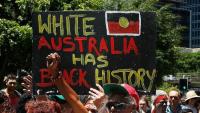
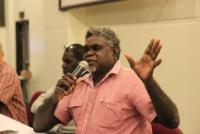
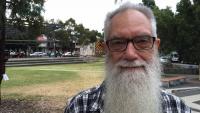
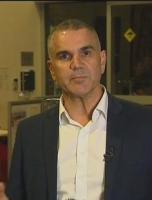
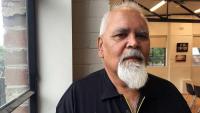

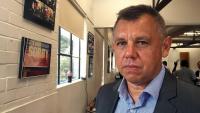
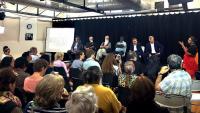
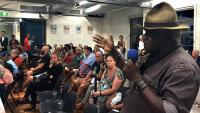
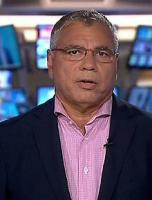

Urgent need for more regional indigenous health professionals
By nacchomedia
"We need to be increasing the number of Indigenous students who go into health degrees. That’s going to be one of the answers to closing the gap.”
Trying to balance my Aboriginal culture within a westernised Australian community is also very difficult. One thing I do know is that I’m proud of the many people that have fought for the rights that have given us more opportunities.
One of the key ways to improving Indigenous health will be to improve access to quality, culturally responsive, multidisciplinary care. To do this Aboriginal and Torres Strait Islander health needs to have a significant presence in the core curriculum of all health degrees across Australia”
For ANU medical student and Kaurna woman Danielle Dries, one of the most significant challenges is the lack of Indigenous medical professionals, about 1800 people short of equal representation in the Australian population.
Read her full story here
“We’re not talking about just the doctors, we need to have nurses, podiatrists, psychologists, all of those, to be able to provide quality health care in rural and remote Australia,”
Ms Rebecca Irwin, Chairwoman of the National Rural Health Student Network ANU students Danielle Dries .
FROM Canberra Times
The recruitment of more Indigenous doctors and medical professionals is a big challenge facing regional health, students from Australia’s rural medical society say.
Representatives from Australia’s 28 rural health student societies met recently in Canberra to talk about the future of rural and remote health.
With a focus on the demands ageing, chronic disease and mental health will place on their work in the future, the students agree that both technology and multi-disciplinary teams have huge roles to play in rural health.
Part of what’s needed is greater cultural sensitivity around Indigenous health. The students point out that while it’s compulsory in medicine to have an Aboriginal and Torres Strait Island curriculum, such a requirement is lacking in nursing and other medical profession courses, Miss Dries said.
“It’s a big thing, because if we’re not teaching people to be culturally responsive providing health care in Australia, where there’s such inequality between Aboriginal and non-Indigenous people, then how are we expected to close the gap?” Ms Dries said.
Having completed stints in both Palm Island and Yuendumu in central Australia, Ms Dries hopes to one day work in the country’s most remote communities.
Ms Dries, who first studied physiotherapy, and fellow ANU student Rebecca Irwin, who first studied nursing, say it was these earlier experiences that drew their attention to the importance of including all health workers in the discussion about the future of rural medicine.
“We’re not talking about just the doctors, we need to have nurses, podiatrists, psychologists, all of those, to be able to provide quality health care in rural and remote Australia,” Ms Irwin, who is also chairwoman of the National Rural Health Student Network, said.
While there were challenges working regionally, some of the advantages were the dedication people had to their work, the opportunities for new professionals to practice clinical skills and the rich social life gained from a small community, Ms Irwin said.
Part of the work of the rural health student network, of 9000 members, was going into communities and high schools and encouraging regional students to take up medical professions and bring the skills back to, if not their own community, then another region, she said.
In April, the conversation on Indigenous participation in the medical professions will continue at the ANU Rural Medical Society’s Close the Gap Conference, where both Dr Jackie Huggins, chairwoman of National Congress of Australia’s First peoples, and Luke Pearson, who runs the IndigenousX twitter account, and others will speak.